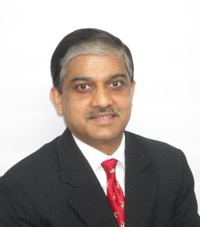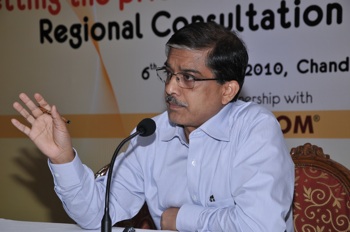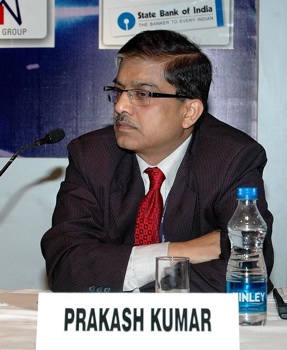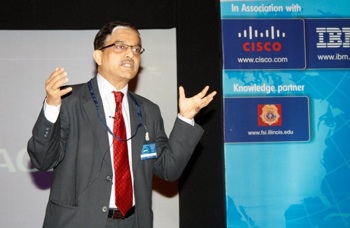 Prakash Kumar, India
Prakash Kumar, India
Director, Public Sector
Cisco Systems India, Internet Business Solution Group
Public Finance Program (’99)
Prakash heads Public Sector vertical of Internet Business Solutions Group (IBSG), the strategic consulting arm of Cisco Systems since September 2008. IBSG helps Global Fortune 500 companies and leading public organizations turn their technology investments into strategic assets that increase productivity and efficiency, reduce costs, and create new revenue sources.
A consistent theme of Prakash’s professional experience has been public policy and management. Prior to joining Cisco, he was a member of Indian Administrative Service (IAS) for 23 years. As such he worked in various capacities with State Governments and the federal government in India holding senior policy and management positions looking after Information Technology, Power Department, human resource management, public finance, land & revenue administration, corporate entities and industrial development. He worked as General Manager of Delhi State Industrial Development Corporation, Chairman-cum-Managing Director of Andaman & Nicobar Islands Integrated Development Corporation (ANIIDCO), Additional Commissioner sales Tax and Secretary to Government of a State looking after IT and Technical Education. Proficient in analysis of information needs of organizations and design of IT Projects. He had opportunity to handle large IT projects in the government and initiate administrative reforms programs.
In his consulting work, Prakash specializes in strategy, policy analysis, and use of ICT to improve the delivery system of the government, especially in developing countries. He holds a bachelor’s degree (B.Tech) in Electrical Engineering from Indian Institute of Technology (IIT) Kanpur, India and a master’s degree in policy analysis from GRIPS.
Please tell us about your career path so far. What is your area of specialization and how did you come to work in this area?
I worked for more than two decades as a civil servant after graduating as an electrical engineer. Joining Indian Administrative Service (IAS), the highest civil service in India is a dream for most of our youth. It offered me great opportunity to work in various capacities in Government (State and Centre) looking after human resource management, public finance, land & revenue administration, power, corporate entities and industrial development. I worked as CEO of a district, General Manager of Delhi State Industrial Development Corporation, Chairman-cum-Managing Director of Andaman & Nicobar Islands Integrated Development Corporation (ANIIDCO), Additional Commissioner sales Tax and Secretary to Government of a State looking after IT, Technical Education, Personnel, Local self-government etc. While I worked in diverse departments and ministries, I got opportunity to specialize in Information Technology and eGovernance. I have spent considerable time in the field of indirect taxation, in which I did my masters at GSPS/GRIPS.
You served for 23 years as member of the prestigious Indian Administrative Service (IAS). What made you leave the IAS?
Leaving IAS was a very difficult decision as was getting into it after competing with half a million aspirants for 200 odd seats. However, my love for information technology and opportunity to work on its application to improve government service delivery drew me to the current assignment. The other factors were declining prestige of government officials in the eyes of people and worsening service conditions in the government.
You are currently Director Public Sector at Cisco Systems India, Internet Business Solutions Group. What are your main responsibilities and tasks?
 I head Public Sector vertical of Internet Business Solutions Group (IBSG), the strategic consulting arm of Cisco Systems since 1st Sept 2008, after I took early retirement from IAS. IBSG helps Global Fortune 500 companies and leading public organizations turn their technology investments into strategic assets that increase productivity and efficiency, reduce costs, and create new revenue sources. We drive market value creation for our strategic customers through world class thought leadership, CXO level consulting services, and solution design/incubation support.
I head Public Sector vertical of Internet Business Solutions Group (IBSG), the strategic consulting arm of Cisco Systems since 1st Sept 2008, after I took early retirement from IAS. IBSG helps Global Fortune 500 companies and leading public organizations turn their technology investments into strategic assets that increase productivity and efficiency, reduce costs, and create new revenue sources. We drive market value creation for our strategic customers through world class thought leadership, CXO level consulting services, and solution design/incubation support.
Description of some of our important projects will provide a glimpse of what we do. We are working with Department of IT, Government of India on implementation strategy and capacity building on 9 billion USD National eGovernance Plan (NeGP). IBSG is providing advisory to Ministry of Urban Development on Smart City Framework for Indian Cities. Earlier we worked with Unique Identification Authority of India, the project which is going to create world’s largest repository of biometric data of 1.2 billion Indians (more than 200 million collected). We provided advisory to Registrar General of India on design of network which will connect 18,000 centres for operating National Population Register. Even though I am out of Government, my work area remains innovation in government’s working using ICT.
You have extensively worked in the area of e-Governance. What is e-Governance? What are the key challenges and opportunities for India over the course of the next five to ten years?
The simplest definition of e-Governance could be technology driven governance. The more formal definition of E-Governance is the application of Information and Communication Technology (ICT) for delivering government services, exchange of information/communication and transactions, integration of various stand-one systems and services between Government-to-Citizens (G2C), Government-to-Business(G2B),Government-to-Government( G2G) as well as back office processes and interactions within the entire government setup. The mission statement of National eGovernance Plan (NeGP) of India puts it quite succinctly.
“Make all Government services accessible to the common man in his locality, through common service delivery outlets and ensure efficiency, transparency & reliability of such services at affordable costs to realise the basic needs of the common man.”
 The major challenges faced by countries like India in eGovernance arena are low access to such solutions on account of high incidence of poverty and low level of literacy which make access devices (PCs or tablets or smart phones) out of reach of majority of people. This gets further accentuated on account of low penetration of Internet, specially in rural areas where 70% of Indians reside. On the other hand use of technology helps the government become accessible to its people for availing various services without need of visiting a government office. The NeGP thus came up with concept of assisted internet kiosks in 100,000 villages operated by local entrepreneurs to provide services to people residing in 620,000 villages apart from creating networks to connect all government offices, data centers to host applications and development of department specific applications in mission mode. The other work going on is to take optical fibre cable to 250,000 villages. The results obtained so far on service delivery improvement has been quite encouraging as it breaks the barriers of hierarchy, time and place and enables people to voice their concern and opinion which reach the right quarters in no time. This is what we saw in Arab Spring. The technology is removing the gap between those who govern and those who get governed, re-defining the power balance between them.
The major challenges faced by countries like India in eGovernance arena are low access to such solutions on account of high incidence of poverty and low level of literacy which make access devices (PCs or tablets or smart phones) out of reach of majority of people. This gets further accentuated on account of low penetration of Internet, specially in rural areas where 70% of Indians reside. On the other hand use of technology helps the government become accessible to its people for availing various services without need of visiting a government office. The NeGP thus came up with concept of assisted internet kiosks in 100,000 villages operated by local entrepreneurs to provide services to people residing in 620,000 villages apart from creating networks to connect all government offices, data centers to host applications and development of department specific applications in mission mode. The other work going on is to take optical fibre cable to 250,000 villages. The results obtained so far on service delivery improvement has been quite encouraging as it breaks the barriers of hierarchy, time and place and enables people to voice their concern and opinion which reach the right quarters in no time. This is what we saw in Arab Spring. The technology is removing the gap between those who govern and those who get governed, re-defining the power balance between them.
It seems India is trying hard to catch up with the leading countries in the area of information policy and e-Governance. What lessons from the Indian experience would there be for other countries?
India started experimenting with use of ICT for improving internal efficiency of the government organizations and service delivery in mid-nineties and has been able to automate many services. However, it took more than a decade and hundreds of failed pilot to start the process in a planned manner covering all important aspects through NeGP. (http://negp.gov.in/ ). India currently ranks 124 in the UN e-Government Development Index.
The lessons learnt are:
-
Plan well, start small and scale fast
-
Political will is needed to carry the project as eGov projects bring fundamental changes in way people work and share power. Hence continuous monitoring by top is a must to overcome basic resistance to change.
-
Well-defined requirements lead to better solution.
-
Take an “outside in” approach to service design – design services that meet people’s needs and make services truly accessible.
-
Focus on quality aspects that matter to citizens: timeliness, accuracy, fairness, cost, accessibility.
-
Listen to your citizens-Spend time in the field – see how existing services work at the front line, see what experiences citizens can share.
-
Get user feedback and change things where necessary
-
Do not pave the cowpath- many legal requirements are not compatible with or don’t anticipate e-services.
-
E-service initiatives provide ideal opportunity to undertake legal review/amendment and BPR – can deliver greater benefits than e-services.
-
Computerising an existing system with weaknesses yields the same problems (Old System + New Technology= Expensive Old System)
-
Hiring of consultants is inevitable because of shortage of eGov professionals in the government. Their engagement from start to end of the project and their neutrality are vital for success of the project. .
-
Build capacity at policy level, management level and operational level, as many functions at these levels cannot be outsourced.
-
Good governance is must for e-governance to succeed
These are some of the major lessons learnt. There are many more but paucity of space here prevents me from talking about them. I will be glad to provide more insight to those who are interested in this topic.
What have been the most interesting or rewarding aspects of your career thus far?
 The first one was the opportunity to work as the CEO of a district in Arunachal Pradesh, a remote hilly part of the country. The second one was to work in Andaman and Nicobar islands. In both these postings one could plan programs and see them getting executed on the ground bringing benefits to the people. At senior levels you work in secretariat framing programs and projects on paper but never get opportunity to see how they get implemented and improve lives of people.
The first one was the opportunity to work as the CEO of a district in Arunachal Pradesh, a remote hilly part of the country. The second one was to work in Andaman and Nicobar islands. In both these postings one could plan programs and see them getting executed on the ground bringing benefits to the people. At senior levels you work in secretariat framing programs and projects on paper but never get opportunity to see how they get implemented and improve lives of people.
The private sector on the other hand has given me the opportunity to work in an area, which I am most passionate about and that is use of ICT for improving service delivery capacity of the governments.
What led you to GRIPS? What is the most important thing you got out of your studies here, and how has your experience at GRIPS prepared you for future endeavors?
It was a very encouraging letter from late Prof Nishino. The warmth in that letter and my desire to learn more about technical prowess of Japan led me to GSPS, which later got converted into GRIPS.
Living and working in multi-cultural and multi-ethnic environment was a great experience which has come quite handy today when I work in an organization which has people of more than 90 nationalities.
What is your fondest memory of your time spent in Japan? And what do you miss most about Japan?
Field trips and long evening sessions with friends from many countries over beer and sake. Even after so many years we are in touch with each other, thanks to Internet. After 10 years of work in government offices, the stint at GSPS was a great break-rather long one (two years in our case).
What is your favourite thing to do when you are not working?
Light reading, listening to music and spending time on Internet.
How do you maintain a balance between your work and the rest of your life?
Work creeps in your non-work time specially when you start working in a virtual work environment, as is happening more and more in the connected world. Employers provide us Net connected laptops and smart phones and in return ensure we are always on job. Younger generation sleeps after checking emails on the Blackberry and wakes up to check it again. The same device keeps you connected to you friends and relatives as well as to your work and thus separating the work is becoming more difficult. I try not to carry work home but I am not always successful.
What advice would you give to current GRIPS students?

Balancing work and life
Maintain a balance between studies and rest of your life and avail all opportunities that this great country offers. One has many things to learn from Japan and its culture.
Do you have any suggestions on how to further utilize the GRIPS alumni network?
We are small in number and dispersed quite widely. Keeping this Human Network intact should be our first priority. It’s painful to see very few people turning up for alumni meet when someone from GRIPS visits our city. Once all the nodes are connected we can utilize the network to help each other and to get more people to apply for GRIPS courses. Many US schools have strong alumni who help each other. We can borrow a leaf from their experience.





